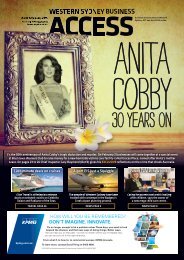RECRUITMENT
WSBA September 2015
WSBA September 2015
You also want an ePaper? Increase the reach of your titles
YUMPU automatically turns print PDFs into web optimized ePapers that Google loves.
GWSRR<br />
“The work environment doesn’t have to be an office<br />
environment as well.” - Tom Graham.<br />
WWW.WSBA.COM.AU<br />
Continued from page 28<br />
And just coming back to that learning, we’re<br />
learning the organisations that we work<br />
most closely with that are willing to invest in<br />
their workforce really are identified as high<br />
performing organisations, and they take that<br />
lifelong learning and they take that learning<br />
– the importance of growing and developing<br />
and changing and learning – back to us to a<br />
point where we can assist them.<br />
Jim Taggart: Ok we are doing a little exercise<br />
now, can each of you think or write down<br />
three critical skills that you consider important<br />
to you and then we’ll go around the room<br />
and share. Hardeep, we’ll start with you.<br />
Hardeep Girn: So, I’ll say the 3Cs, that<br />
are around the Mastering Business Introductions<br />
course that we’ve got with TAFE,<br />
Confidence, Capability and Conversation. I<br />
think those skills are significantly lacking in<br />
any area of business whether you’re talking to<br />
internal customers or you’re talking to external<br />
customers. I think customer service as a whole<br />
requires quite a bit more of an upgrade. I think<br />
that the conversations that most industries<br />
have is very much: Well, these are the products<br />
and services that I have. I’m an auditor. This is<br />
what I do.<br />
Jim Taggart: Great. David?<br />
David Pring: I think it’s change, openmindedness<br />
and communication.<br />
Jim Taggart: OK. Interesting.Tom?<br />
Tom Graham: Well I’m not sure you’d<br />
call it a skill. I’ve always said: attitude before<br />
aptitude. That’s been one of my expressions.<br />
How do you put that into an actual skill, you<br />
know? Interpersonal skills is another, which<br />
you touched on. And then analytical skills. It<br />
doesn’t matter what the job is. It can be auditing,<br />
accounting orHR. Just to be able to analyse<br />
an issue or problem and find a solution.<br />
Jim Taggart: Thanks Tom. Alison?<br />
Alison Wood: Very similar. So, technical<br />
skills relates back to capability. So that’s about<br />
actually having the technical skills to do the<br />
job. And the interpersonal skills relates back to<br />
the emotional intelligence, and it comes back<br />
to the customer experience too – because all<br />
of that really is around thinking about the customer<br />
at the centre of the journey. And then,<br />
the last one was critical thinking, problem<br />
solving or, you know, how to – innovation.<br />
Again, it’s your analytical skill. So, there’s quite<br />
a lot of similarity between what we’re saying.<br />
Jim Taggart: That’s interesting. Thanks<br />
Alison. Nicole?<br />
Nicole Karagiannis: I’ve changed mine<br />
in the last 10 seconds. They’re not very similar.<br />
So, to me, active listening. So, that bit around:<br />
seek first to understand before being understood.<br />
So, it’s all really under the banner of communication<br />
and conversation. The second one<br />
is taking feedback. And really, from an HR<br />
profession point of view, it’s often you know<br />
Jim Taggart.<br />
WESTERN SYDNEY BUSINESS ACCESS SEPTEMBER 2015<br />
Hardeep Girn and Jim Taggart.<br />
people like me are the middle man going: You<br />
are not a good leader, or, you are not a good...<br />
You know. Having those really painful, difficult<br />
conversations. If we empowered our leaders<br />
and employees to have them themselves, how<br />
good would that be? And the third one is back<br />
to my bit around learning. So, having the appetite<br />
to learn – not walking in saying: I know<br />
it all already. So that appetite’s very important.<br />
Jim Taggart: Thanks Nicole. Scott?<br />
Scott Henshaw: Good question. I mean<br />
I’ve just done a little mental survey of a decade<br />
in recruitment. And what I reckon the three<br />
most commonly wanted things would be:<br />
communication skills – which probably falls a<br />
little bit under that customer service/interpersonal.<br />
That’s always been No: 1. I don’t know<br />
if this is a skill. Ability to work with others –<br />
this team player thing which I think often is a<br />
euphemism for just: Can they fit this place and<br />
can they get along with everybody else. And third<br />
– intelligence. People always ask me it. And<br />
I think this ties to the willingness and the capability<br />
to learn. When you unpack it, it’s the<br />
appetite to learn and the ability to grasp new<br />
concepts and conflict resolve and all those<br />
sorts of things. I think they’d be the three.<br />
Jim Taggart: For me….interpersonal<br />
skills. One that’s critical is adaptability. Is it<br />
really important with regards to people. And<br />
the third one is team players – being part of a<br />
team is really critical for me. You don’t have<br />
to like the person, but you have to have the<br />
respect to say: Look, you don’t like me; I don’t<br />
like you; but we’ve got this job to do – or task.<br />
Getting the job done is critical. That’s what’s<br />
brought us together. And I’ve got to handle<br />
that the best way I can. I can either get caught<br />
up in that melee or move back. If I move back<br />
and do the task, I’m at least going to get some<br />
reward. Anyway, I didn’t want to go on. But<br />
that’s my three.<br />
Michael Walls: Ok so I’ve got critical or<br />
analytical thinking, which is the capacity to<br />
frame a problem or an issue, second would<br />
be communication and people skills and<br />
the third would be adaptability and cultural<br />
awareness; so, you’re aware where you fit into<br />
a culture and can adapt and still be successful.<br />
Jim Taggart: Ok I really now want to look<br />
at the whole area of skills and what’s happening<br />
out here. And I want to ask this question<br />
– and it’s a statement. Employers should pay for<br />
training and development of their staff. Yes?<br />
Alison Wood: What a loaded statement?<br />
Nicole Karagiannis: It depends on the<br />
applicability. But if I say to my manager: I<br />
want to do my Diploma in Fitness – becoming a<br />
personal trainer, and I’m in the HR profession<br />
– it depends on whether you’re thinking about<br />
something not relevant to my profession or to<br />
my organisation. I should pay for that myself.<br />
Whereas, if it’s something that’s going to add<br />
value to the organisation, and I need to put<br />
that case forward, then they should either cofund<br />
it or pay for the whole thing. That’s sort<br />
of how I see it.<br />
Tom Graham: Can I come back a step?<br />
Somebody is applying for a job – probably<br />
right down your track Nicole. They say: OK,<br />
I’m going to go for this job now. I think this looks<br />
good. But what are my career opportunities?<br />
How am I going to develop? What’s my next step?<br />
How do I get there? There must be a corporate<br />
plan in place which includes training of the<br />
individual moving into higher positions - a<br />
management training programme. Imagine<br />
some of these managers have not been trained<br />
about their responsibilities like how to handle<br />
staff and things of that nature. I mean there<br />
has to be a corporate vision and the Company<br />
should be paying for it.<br />
Hardeep Girn: I agree with that as well.<br />
The corporation needs to ensure employees<br />
are trained to the correct level to do their job.<br />
If they’re not capable of doing their job, then<br />
they are not best representing the products or<br />
services that they’re looking to sell. So, I think<br />
it comes down again to Nicole’s point – value.<br />
They have to be adding value. If they want to<br />
take a course in personal fitness, you can argue<br />
whether that’s going to add value to the organisation<br />
if they’re a healthy individual and know<br />
about first aid and various other aspects. But I<br />
think it has to be that 80% of typically what an<br />
employee wishes to do has to be related back<br />
to what is the core services and products that<br />
are sold by that organisation and how it can be<br />
applied to grow value for that organisation.<br />
David Pring: I think there needs to be<br />
a change in the mindset of employers. We<br />
talked before the break around: do employers<br />
know what they want. And I’m not sure how<br />
employers at the moment can know what they<br />
want from employees because their businesses<br />
are being disrupted and changed so much.<br />
And there’s so much change – you know, automation<br />
etc – that’s happening. And if a business<br />
is looking for its niche, its differentiator,<br />
for its ability to become globally competitive, I<br />
think it must take on a bigger responsibility, or<br />
recognise that there is an ongoing need for additional<br />
training as the business itself morphs<br />
and evolves. The right people and then adaptability<br />
and change in skills have got to become<br />
more and more important, I think.<br />
Scott Henshaw: I think back to your<br />
point earlier, the employee expectation is<br />
certainly that “the organisation I join trains<br />
me and invests in me”. I think we talked earlier<br />
about the key variables that candidates look<br />
at in making their decision around, you know,<br />
what employer they go with – and we talked<br />
about money and all sorts of things. But I<br />
think you guys nailed it – that the surveys that<br />
we’ve conducted and a lot of the survey stuff I<br />
read in and around our industry – professional<br />
development and training are the No: 1 things<br />
consistently around “what my organisation<br />
give me”. So, whether there’s a right or wrong<br />
to it, at the moment the way the market stands<br />
is employees have the expectation that “my<br />
employer will train me – and if they don’t, I’m<br />
going to go to an organisation that does”.<br />
Alison Wood: A lot of employers don’t,<br />
though. I mean there’s real variability amongst<br />
industries and how much they’re willing to<br />
take on that role. My view is that employers<br />
have the role of workforce capability and<br />
development. And a lot of that is on-the-job<br />
training as we were talking during the break.<br />
Continued on page 30<br />
29






